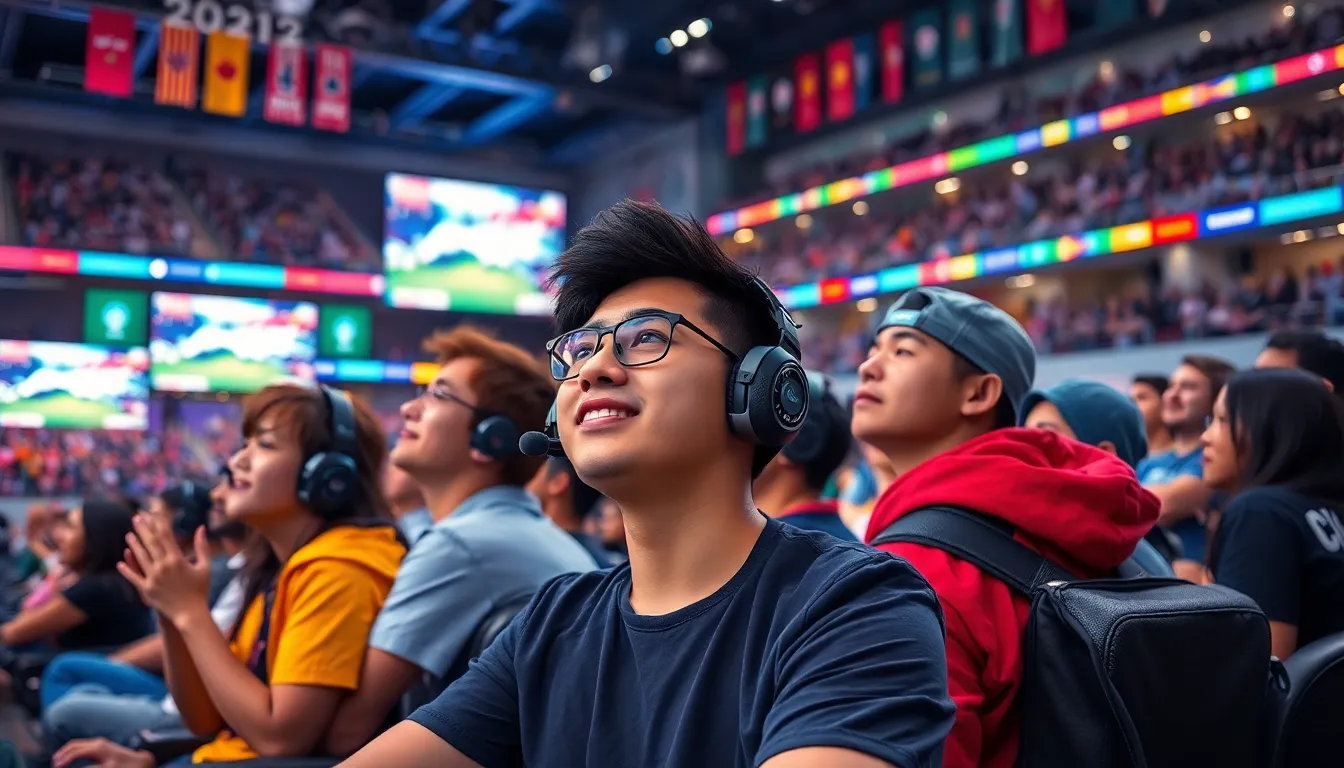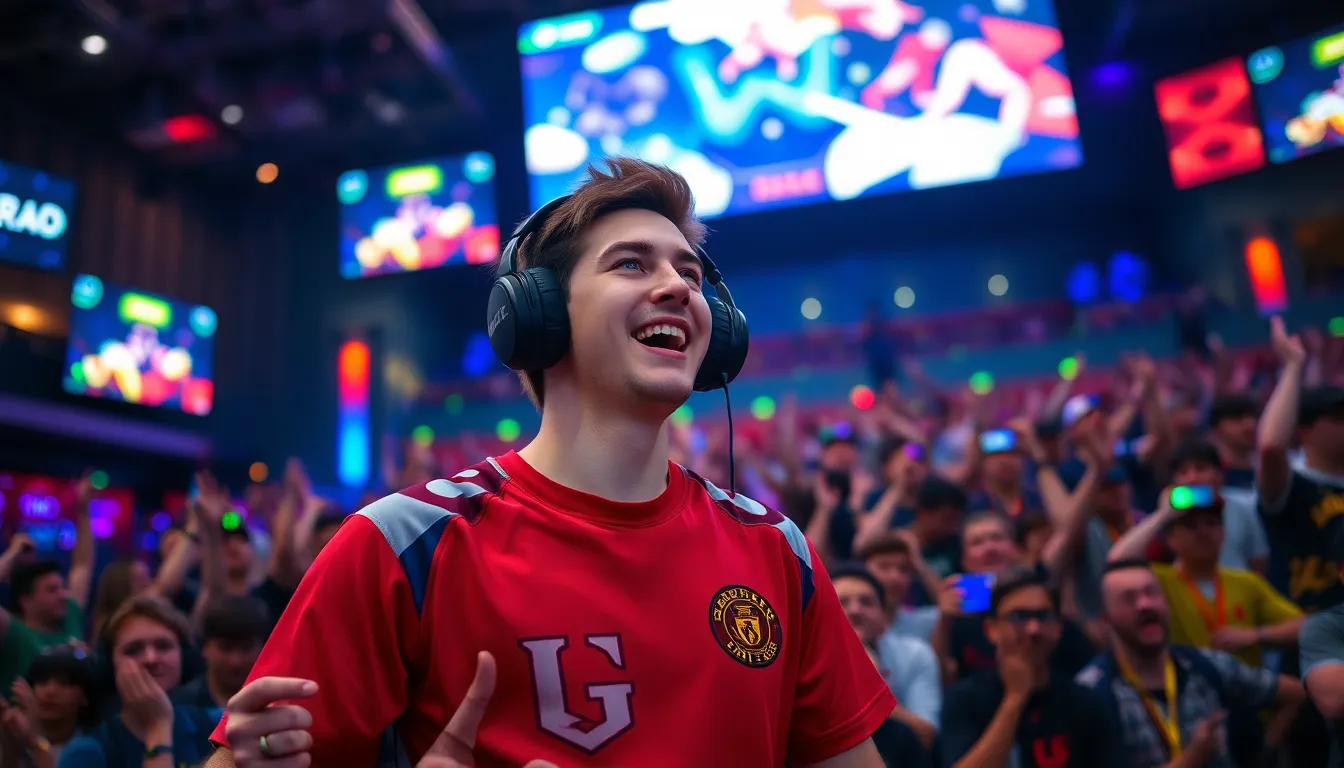In a world where gaming has leveled up from basement dwellings to sold-out arenas, esports fandom is the new frontier of entertainment. It’s not just about playing anymore; it’s about cheering, strategizing, and sometimes even crying over pixelated heroes. Fans don’t just watch—they live and breathe every match, forming communities that rival the most passionate sports fanatics.
From the thrill of a last-minute clutch to the agony of a team’s epic fail, esports fandom delivers drama that even the best soap operas can’t match. Whether it’s debating the best strategies or donning team jerseys, these fans are in it for the long haul. So grab your snacks and settle in, because the world of esports is more than just a game; it’s a lifestyle that’s taking over the globe, one epic match at a time.
Table of Contents
ToggleUnderstanding Esports Fandom
Esports fandom has evolved into a unique social phenomenon, marked by passionate communities centered around competitive gaming. Fans immerse themselves in various aspects, from favorite teams to engaging content.
Definition of Esports Fandom
Esports fandom encompasses the enthusiasm and loyalty that individuals exhibit toward esports teams and players. This dedication often manifests through online communities, social media interactions, and live events. The fans establish connections based on shared interests in games, tournaments, and player achievements. Observing matches becomes a communal experience for many, as supporters cheer for their chosen teams. Additionally, fandom transcends casual viewing, transforming into a lifestyle where followers actively participate in discussions, fan art, and merchandise purchases.
Importance of Esports Fandom
Esports fandom plays a crucial role in the industry’s growth and sustainability. Engaging fans contributes to increased viewership, which directly influences sponsorship and funding opportunities for teams and events. Fans’ emotional investments also enhance the overall experience, motivating players to perform at their best. A strong fan base strengthens team identity and loyalty, fostering a sense of belonging. Furthermore, esports fandom drives social interaction and collaboration among individuals worldwide, breaking geographic barriers.
Characteristics of Esports Fans

Esports fans exhibit distinct characteristics that set them apart from traditional sports enthusiasts. Understanding these traits offers valuable insights into their engagement and the growing culture of esports.
Demographics of Esports Fans
Age ranges among esports fans vary, with a significant concentration between 18 and 34 years old. This group often consists of tech-savvy individuals who grew up with video games. Gender representation reflects increasing diversity, as the fanbase includes both male and female supporters. Geographic distribution spans globally, with a strong presence in regions like North America, Europe, and Asia. According to research by Newzoo in 2023, over 220 million individuals worldwide actively engage with esports. Insights into these demographics reveal the potential for targeted marketing and community building.
Behavior Patterns Among Fans
Fans demonstrate various behavior patterns that contribute to the vibrant esports culture. They frequently participate in online discussions across platforms like Twitch, Discord, and Reddit. Active engagement during live broadcasts highlights their enthusiasm, creating a sense of community among viewers. Attendance at live events, such as tournaments and conventions, showcases loyalty to teams and players. Fans often invest in team merchandise, displaying their support. Streaming platforms attract viewership, with reports indicating that esports audiences have surpassed 500 million globally. Such behaviors underscore the commitment fans have to their favorite games and teams, enriching the esports ecosystem.
Platforms and Communities
Esports fans thrive on various platforms, engaging in competitive gaming culture. Communities form around these platforms, fostering a deep connection among supporters.
Popular Platforms for Esports Fans
Streaming services like Twitch and YouTube Gaming dominate the landscape, providing real-time broadcasts of esports events. Fans watch professionals compete while interacting via chat, creating a lively atmosphere. Platforms also host fan interactions, such as Q&A sessions and tournaments, which enhance engagement. Mobile apps, like Discord, allow fans to connect with teammates and discuss strategies, expanding community involvement. Over 120 million people visit Twitch monthly, underlining its significance in the esports realm.
Online Communities and Social Media Influence
Online forums and social media platforms harbor diverse communities, where fans exchange opinions and share highlights. Platforms like Reddit and Twitter facilitate discussions on match predictions and player performances. The ease of creating content helps fans participate actively, with hashtags trending during major tournaments. Visual content on Instagram and TikTok enables fans to showcase their favorite moments and merchandise, amplifying brand loyalty. Community-driven events amplify fandom by fostering solidarity among supporters, making social media essential for involvement.
Impact of Esports Fandom
Esports fandom significantly shapes the industry, not only through passionate engagement but also via economic and cultural dimensions.
Economic Contributions to the Esports Industry
Esports fandom generates substantial revenue for the industry. In 2023, global esports revenue is projected to exceed $1.8 billion, driven by fan engagement and sponsorship deals. Brands actively seek partnerships, drawn by the increasing viewership that surpasses 500 million individuals. Merchandise sales also contribute, with fans purchasing jerseys, collectibles, and gaming accessories to support their favorite teams. Ticket sales from live events enhance income streams, attracting fans from various regions. Each of these elements illustrates how fans play a pivotal role in driving economic growth within esports.
Cultural Influence of Esports Fandom
Cultural exchanges flourish within esports fandom, as diverse communities share common interests. Fans from different backgrounds connect over gaming experiences, fostering inclusivity and collaboration. This interaction influences popular culture, as games and characters become integrated into mainstream media. Streaming platforms amplify these cultural trends, where fans showcase their skills and creativity. Music collaborations and merchandise integrations with popular artists further highlight this influence. Unique fan-generated content spreads across social media, reinforcing the bond fans share over their passion. Collectively, these aspects solidify esports fandom’s position in contemporary culture.
Esports fandom has evolved into a powerful force that shapes both the gaming industry and popular culture. The passionate engagement of fans fuels not only the growth of esports but also fosters a sense of community and belonging. As fans continue to connect through various platforms and events their collective enthusiasm enhances the overall experience of competitive gaming.
This vibrant culture reflects a deep emotional investment that transcends mere entertainment. With the industry’s expansion and increasing viewership esports fandom is set to play an even more significant role in shaping the future of gaming and community interactions. The journey of esports fandom is just beginning and its impact will be felt for years to come.

